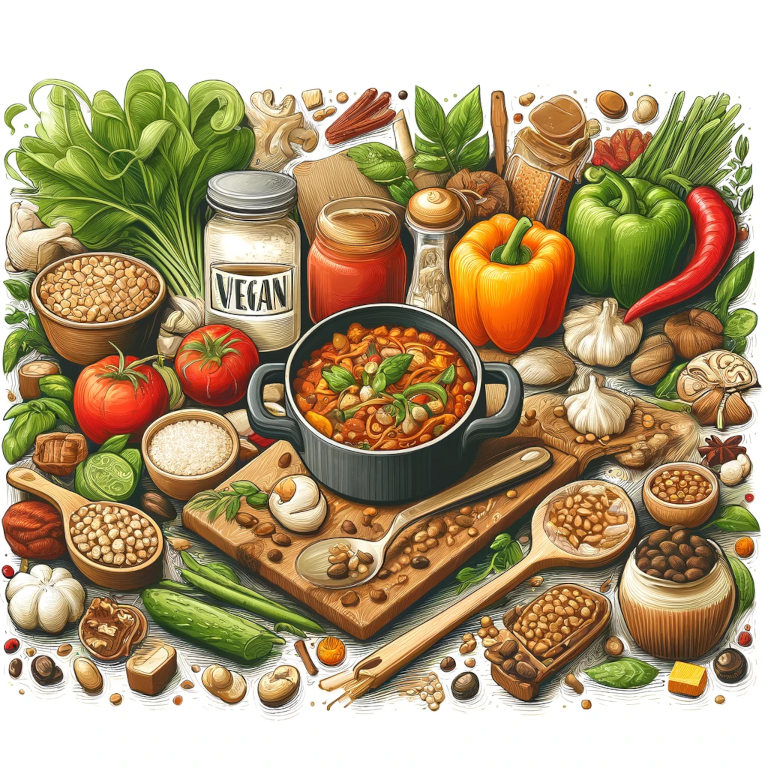Vegan cooking, once a niche dietary choice, has surged in popularity over the past decade, driven by health, environmental, and ethical considerations. As an expert in food and cooking, this article delves into the vibrant world of vegan cuisine, offering tips and insights to help both novices and seasoned cooks create delicious, nutritious plant-based meals.
What is Vegan Cooking?
Vegan cooking involves preparing dishes without the use of any animal products. This includes meat, dairy, eggs, and other derivatives such as gelatin. Instead, vegan cuisine focuses on fruits, vegetables, legumes, grains, nuts, and seeds, as well as a diverse range of plant-based proteins and fats.
Benefits of Vegan Cooking
The benefits of adopting a vegan diet are manifold:
- Health Benefits: Numerous studies link vegan diets to lower risks of heart disease, hypertension, type 2 diabetes, and certain types of cancer. Vegan diets are typically rich in dietary fiber, antioxidants, and beneficial plant compounds.
- Environmental Impact: Vegan cooking reduces reliance on animal farming, which is a major contributor to greenhouse gas emissions, water usage, and deforestation.
- Ethical Considerations: Many choose veganism to avoid contributing to animal suffering and the often inhumane conditions of the meat and dairy industries.
Essential Ingredients in Vegan Cooking
Transitioning to vegan cooking can seem daunting, but stocking your pantry with the right ingredients can make it simpler and more enjoyable:
- Proteins: Tofu, tempeh, seitan, and legumes are excellent protein sources.
- Dairy Alternatives: Almond, soy, oat, and cashew milks are great for baking and cooking.
- Healthy Fats: Avocados, nuts, seeds, and coconut oil provide necessary fats.
- Flavor Enhancers: Nutritional yeast, spices, herbs, and fermented condiments like tamari and miso add depth and complexity to vegan dishes.
Tips for Vegan Cooking
- Experiment with Global Cuisines: Many cultures have rich traditions of plant-based cooking. Indian, Mediterranean, and East Asian cuisines offer a plethora of vegan recipes.
- Learn to Substitute: Mastering substitutes is key in vegan cooking. For instance, flaxseed mixed with water can replace eggs in baking, and blended cashews can mimic cream.
- Embrace Whole Foods: Focus on whole, minimally processed foods to maximize nutritional value.
- Plan Meals: This ensures a balanced intake of proteins, fats, and carbohydrates, and prevents nutritional deficiencies.
- Get Creative with Seasoning: Without meat, you can bring dishes to life with bold seasoning and fresh herbs.
Popular Vegan Recipes to Try
- Vegan Chili: Rich with beans and spices, it’s a hearty meal perfect for cold days.
- Cashew Alfredo Pasta: A creamy, satisfying dish that rivals its dairy counterpart.
- Chocolate Avocado Mousse: A dessert that’s both indulgent and healthy.
Engaging with Vegan Cooking
Whether you’re exploring vegan cooking for health reasons, environmental concerns, or ethical benefits, the kitchen offers a space to creatively engage with plant-based ingredients. As more people embrace vegan diets, the variety and quality of vegan products and recipes continue to grow, making it an exciting time to explore this dynamic culinary style.
By integrating thoughtful planning and creative cooking techniques, vegan cuisine can be a deeply satisfying and delicious way to eat. Each meal is an opportunity to nourish the body, respect the planet, and celebrate the flavors that nature provides.






